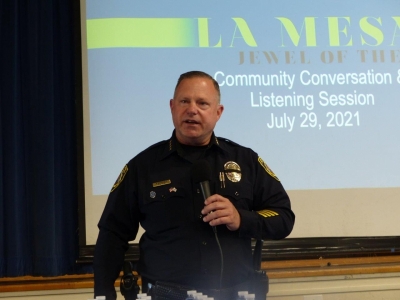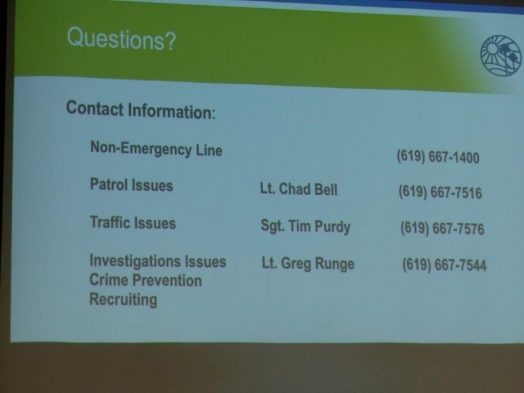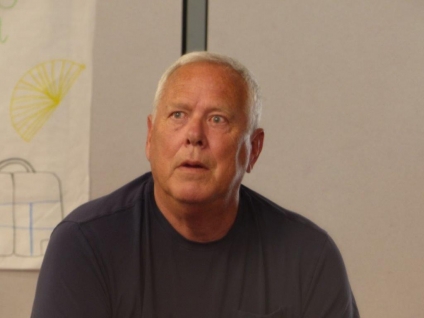 By Miriam Raftery
By Miriam Raftery
Photo: LMPD Chief Ray Sweeney
August 8, 2021 (La Mesa) – At the first of four town hall meetings held by La Mesa Police billed as community outreach and listening sessions, newly appointed Chief Ray Sweeney promised to work with community members to make changes. The Chief spoke of changes in the work, then fielded questions from the public.
Chief Sweeney speaks out
“2020 was probably one of the most challenging years for the city,” he acknowledged. The year that included racial justice protests, a riot, use of force concerns against protesters and a police officer fired for falsifying a report. “We can never forget our past,” he told the small but engaged audience at Rolando Elementary School, “but we are going to continue to improve.”
Chief Sweeney said he is “humbled” by his appointment and promised to hold community forums regularly, as well as walking to businesses, in neighborhoods, and forming focus groups to find solutions. “We want you to know us. We all have families and kids…and we all care about La Mesa.”
Janet Castano, Chair of the Citizens Police Oversight Board in La Mesa, said Chief Sweeney has already had an important meeting with the CPOB chair. “We still have work to do,” she said, adding, “We’re excited to have Chief Sweeney here.”
Chief Sweeney praised the CPOB and laid out a six-point plan for reforms:
- Community Police Oversight Board
- Public trust
- Fair and unbiased policing, being culturally aware and de-escalation
- Diversity in recruiting and retention
- Police review
- Emergency preparedness
He acknowledged that in the past five years, before he was Chief, “We have not done a good job of getting out in the community and listening. Public trust is critical for us to do our job.”
 Photo, right: LMPD 6 Point Plan
Photo, right: LMPD 6 Point Plan
LMPD has new software called Spider Tech ready to roll out, which will let a customer calling 911 know what’s next – what detective is assigned, who to call, how long follow-up should take and more. The technology will also allow the department to send out surveys.
“By January 2022, we will start collecting racial profiling data beyond what the DOJ (Department of Justice) requires,” Chief Sweeney said. The data will be used to look for patterns and the first report to the DOJ due by July 2023 will be shared with the community for transparency, he promised.
To improve fair and unbiased policing, the department is improving training and sending policies to the CPOB soon; policies must be “community based,” Sweeney said. When an officer pulls someone over, he noted, “I expect compassion and empathy…Slow it down and listen – and nine times out of ten, we have time to do that.”
The District Attorney recently held an eight-hour de-escalation class with staged scenarios so officers can see how people react to their actions. “We also have a similar, with an opportunity to change the outcome,” Chief Sweeney said. “We can learn from our mistakes – and it’s better to learn there, than on the streets.”
 Photo, left: Chief Sweeney also posted a list of LMPD contacts for the community.
Photo, left: Chief Sweeney also posted a list of LMPD contacts for the community.
On diversity among the ranks, he said, “We are doing fairly well with diversity, but we can do better…The diversity of La Mesa is huge; it’s wonderful, but we need more. We are down four positions now.” A recruiting team was on hand for anyone interested in learning how to join the police force.
As for policy review, LMPD is shifting to a policy management tool that will send daily briefings to officers with updated state and federal rules, ad more.
On emergency preparedness, the Chief exclaimed, “Boy is this important! We need to be ready for anything.” He noted a report has been done (by an outside independent agency) in the aftermath of the May 30, 2020 protest and riot.
LMPD has 69 sworn officers for 60,000 people. “That’s just not enough,” Sweeney acknowledged. So, the department relies on mutual aid with option for the San Diego Sheriff’s department to assume command authority, as happened the night of the riot.
As for large protests or assemblies, he stressed the importance of allowing everyone to express views on First Amendment issues safely. The department has a mobile field force, is looking at best practices, and has all police policies posted online.
Audience Questions
Gene Carpenter noted that although the meeting was in West La Mesa, which has a high concentration of African-American residents, none of the six Black officers on the LMPD were present. He thanked those officers who did come out and suggested that in the future it would be helpful to have one or more black officers at community meetings, as well as at City Council meetings “even if you have to pay them for that.”
Chief Sweeney agreed, firing back, “I’ll pay them!”
Carpenter also asked to see more diversity in the management ranks at the LMPD.
Castano voiced interest in more engagement with youths, immigrants and refugees. She noted the department has a youth camp, but asked, “How can we engaged with them to go into the Grossmont College program” to train future officers?
Daniel Paugh, the school resource officer for all of La Mesa, said some programs were put on hold due to COVID-19, but others are now starting up such as plans for a “Pizza with a Popo” program for kids to meet with police and an “Ask Me Anything” program soon to roll out at Helix.
 Photo, right: Gene Carpenter
Photo, right: Gene Carpenter
Katy Lynch, an officer who works with youths and is also the LMPD’s LGBTQ liaison, said they’ve gone fly fishing with kids on the bay and fishing at Otay Lakes with kids from Bancroft Elementary. “I’ve had officers knocking on the door to do this and we don’t pay them – they volunteer,” she said.
Chief Sweeney called conversations between law enforcement and underprivileged youths as well as young people of color “a gamechanger.” Officers come out of uniform and after kids are surveyed on their perception of police, officers and youths eat together and play games. “We’re going to bring that to Helix High,” he said.
A woman in the audience asked about Defend East County at a protest in July 2020. “Police were backslapping and friendly with the DEC, a known supremacist group,” she said. “A lot of people on social media were saying police are friendly with the DEC.”
Sweeney replied, “When we have protesters and counter protesters, that’s the hardest job in the world. Our job is to make sure everyone has a say and keep the peace.
The woman followed up by noting there were “lots of weapons and I didn’t see anyone arrested….There were knives.”
Sweeney said there were arrests and noted that knives were not illegal in the area where they were openly carried by some. “Were there fights? Yes, but it could have been much worse.”
Castano asked, “When you collaborate with mutual aid groups, how do you make sure they have the same values?” Sweeney acknowledged this can be hard to do when there are many officers responding to a large incident.
Another audience member said she is deeply disturbed by events last year” and called for more training on avoiding bias beyond eight hours. She called La Mesa a “poster child for bad people coming into the city. What do you intend to do to improve how people are responding?”
The Chief replied, “We have things that happened in La Mesa that should never have happened.” The key is building respect, he reiterated, treating everyone “just like your mother or father.” He noted that LMPD officers have body-worn cameras now, adding, “We never stop learning. I love to learn, love to get better.”
ECM’s editor asked what police could do to better prevent violence by outside agitators, such as Antifa-type groups and white supremacists type groups, including some individuals notorious for instigating fights at multiple East County protests. She asked if media could recognize these individuals and foresee when violence might occur, why have police departments in multiple local cities not intervened to prevent harm?
Sweeney said, “We do follow them,” but said officers stay “under the wire” adding that when misdemeanor crimes occur, the priority is protecting protesters. “We have a special investigation unit and we want to stay ahead of the curve,” he said, but noted that size of protests may sometimes limit response. “Hopefully, we can prevent it before it happens,” he said, then encouraged the public to send in social media posts voicing threats and to send in photos if they observe crimes occurring at an event. “When there is a crime, hopefully we can solve it later.”
An audience member asked about a new California use-of-force bill. Sweeney noted that LMPD has changed to “Shall, not should” regarding de-escalation as a priority.
A woman asked about a mentally ill man for whom two police officers were dispatched without a PERT team trained in psychiatric response.
Chief Sweeney explained that the city was briefly without a PERT officer but now has a PERT officer 40 hours a week who rides along with officers. In addition, LMPD now has officers trained in psychiatric response and the county is doing a program so that if someone is in a mental health crisis that’s not an emergency posing danger, the city’s new homeless outreach and mobile engagement team can respond.
Captain Matt Nicholas explained, “The goal is to take a housing first approach, building trust,” noting that some homeless people may not listen to police, but will listen to the two homeless outreach nonsworn personnel with expertise in homelessness issues. “It’s a win-win for the community, officers and homeless – and it minimizes use of force,” he said. “It’s not a crime to be homeless.” The public can call 667-1400 to dispatch the team, but it’s not 24 hours, so there may be delay if the situation is not urgent. “We really don’t want to go cite them if we can help them,” Nicholas said.
Mejgan Afshan, a candidate running for La Mesa City Council and past election volunteer, noted that Defend East County and Antifa have both “rebranded” under new names or splinter groups. “I had hate mail dropped off at my home…What is the police department going to do to address the white supremacy issue in La Mesa?”
Chief Sweeney said this is a “collaborative effort, but we need the District Attorney on board.” Intelligence sharing is key, he said, then added that “On August 25th we will be having a forum on hate crimes that we’ll hold with the DA.”
One audience member voiced concern about “not enough police to follow up on hate crimes. These unsavory types are really taking over…they capitalize on the situation to wreak havoc. Will you go after known white supremacists who continue to show up?”
Sweeney repeated the need for cooperation with the DA, but pledged that if someone comes with an intent to commit a crime, such as when it’s posted on social media, “We absolutely will make an arrest.”
Carlos Tomaino, Assistant City Manager, described his untimely arrival on the job. “I accepted this job on May 29, 2020,” he said. “When I arrived, they’d boarded up city hall; someone had tried to burn it down. I felt the embarrassment, but in the 13 months that I’ve been here, I’ve seen a lot of changes…These guys are not quitters. This is hard to do,” he told the Chief and officers present, “So thank you. When people ask me now, `How are things going in La Mesa?’ I say, `great.’”
Carpenter asked the Chief if he feels that the Police Officers Association (POA) is on board 100% with reforms, noting that he saw a mailer and “sensed divide.”
Chief Sweeney said he used to be a POA president for two years. “I’ve shared the changes we need to make and they are 100% on board,” he said of the POA. “It takes a team to move mountains. The POA is everyone in this room,” he said of fellow officers present. “We may have different opinions, but everyone is on board.”
The Chief cited his ties to the community, stating that his children went to Rolando Elementary, La Mesa Middle School and Helix High. He admits to his own occasional mistakes, notably missing his son’s broken shin on the soccer field despite his service as a U.S. Army Medic. But his heart is in the community.
“We bought our first house in La Mesa. This is the Jewel of the Hills,” he said. “We love and care for this community, and we will do whatever it takes to protect this community and everyone feel safe and inclusive…This is how we’re going to solve problems,” he said of the community meeting. “Together, we will do that.”
One woman voiced skepticism, noting three past incidents including a 2018 Helix High female student of color knocked to the ground by a school resource officer, the controversial stop of a young Black man at a trolley station for which an officer was fired after falsifying a report and the injury of a protester shot between the eyes by a beanbag during the May 30 protest last year. “My trust is down here,” she told Chief Sweeney. “Two of those officers are still on the force – and if it happens again, we’re going to be looking at you.”
Future LMPD town hall meetings
There are two LMPD community listening sessions coming up with Chief Sweeney and other officers, each from 6-8 p.m. on these Thursday evenings:
August 12: Maryland Avenue Elementary School
August 19: Northmont Elementary School













Comments
Keep your eye on the ball